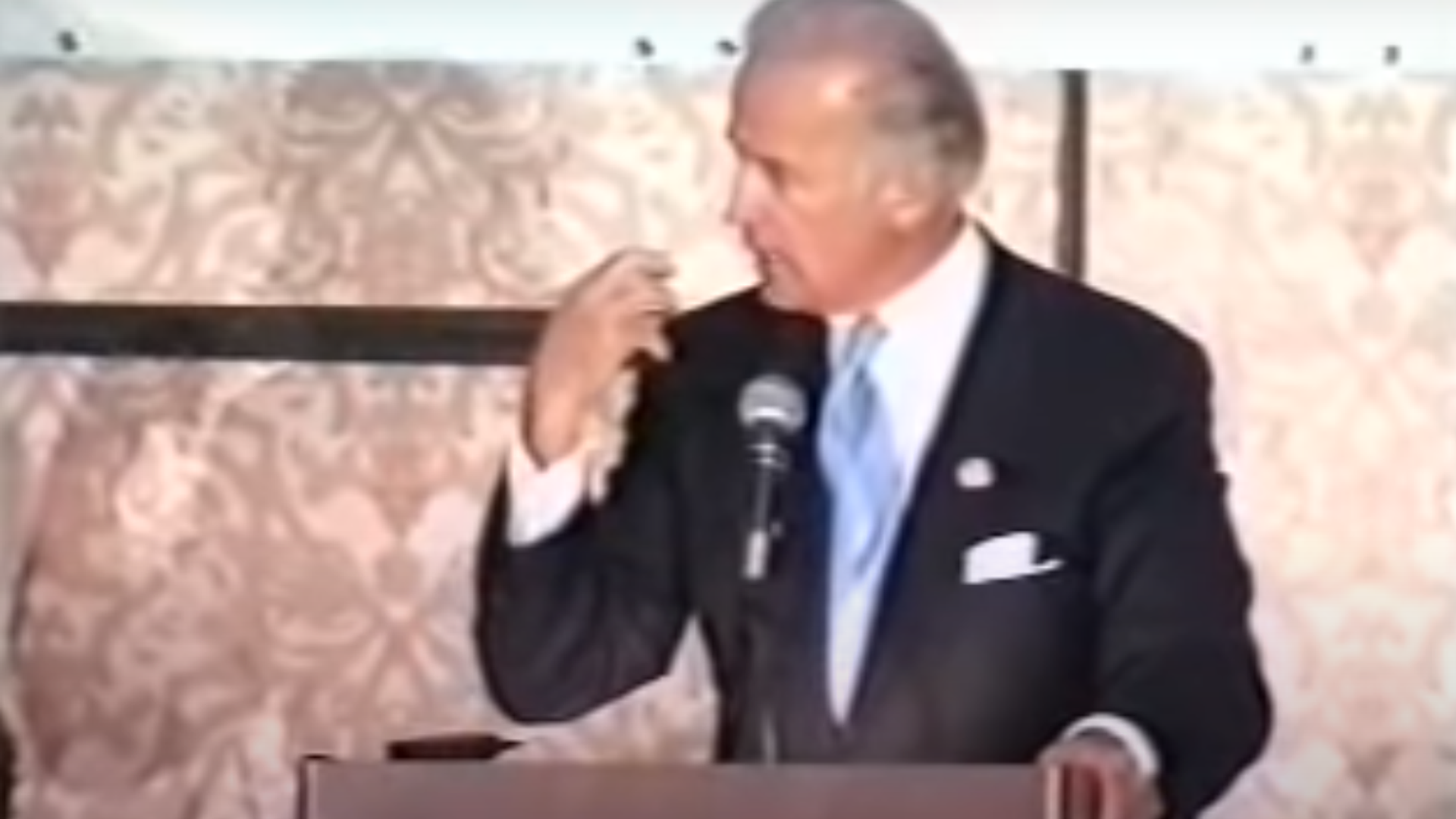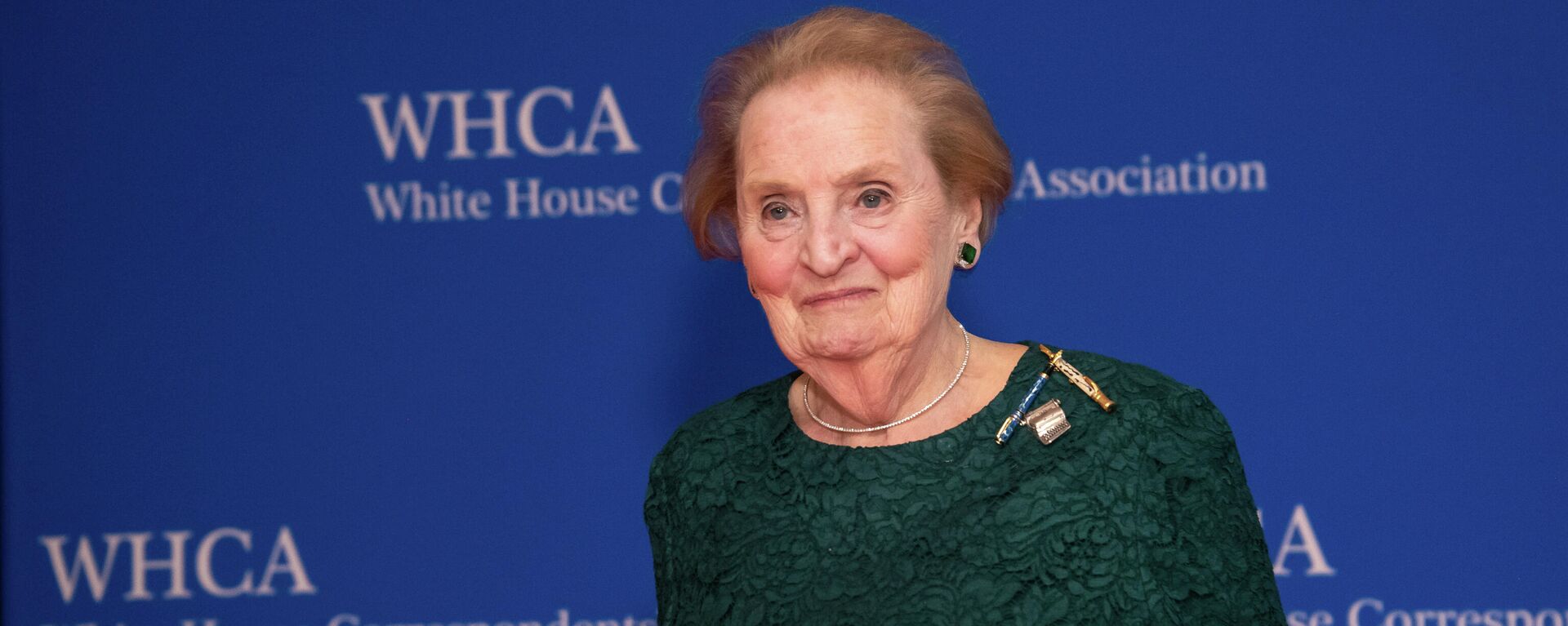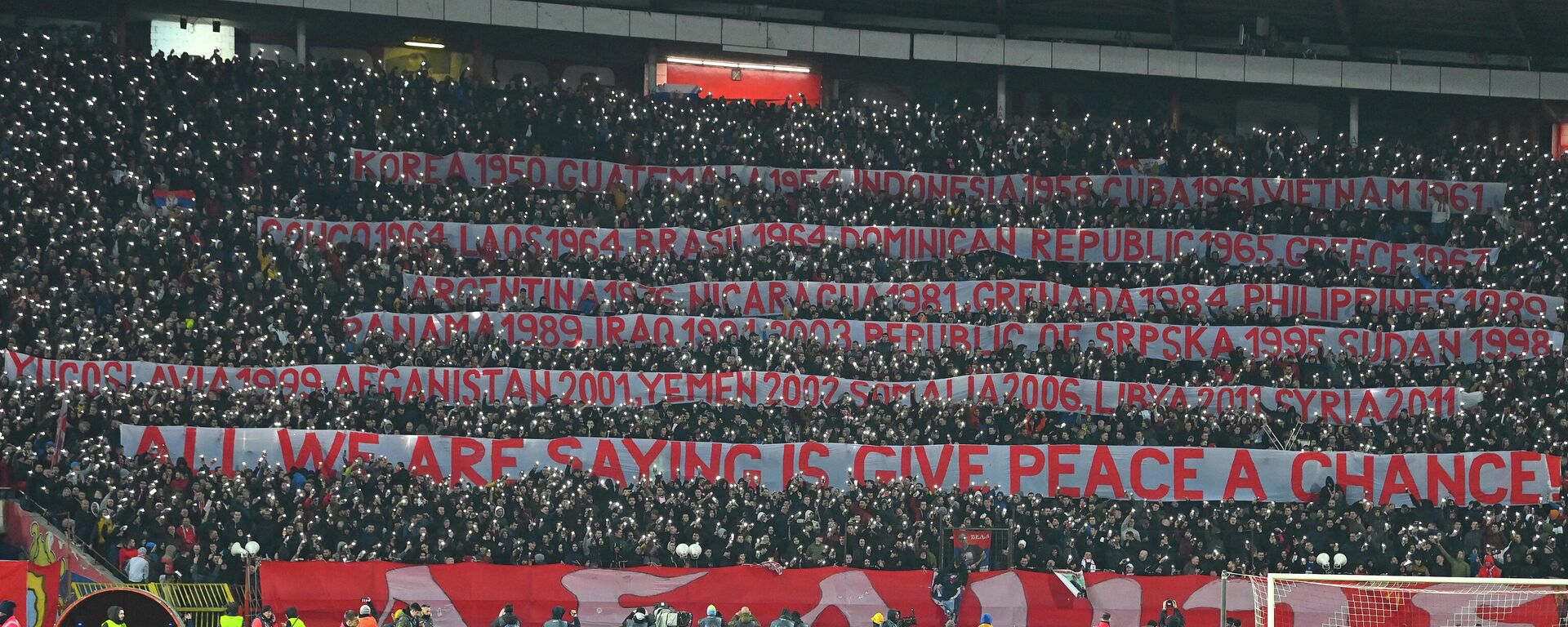https://sputnikglobe.com/20220324/we-should-go-in-on-the-ground-watch-biden-complain-nato-bombing-of-yugoslavia-not-ruthless-enough-1094148230.html
‘We Should Go in on the Ground’: Watch Biden Complain NATO Bombing of Yugoslavia Not Ruthless Enough
‘We Should Go in on the Ground’: Watch Biden Complain NATO Bombing of Yugoslavia Not Ruthless Enough
Sputnik International
Thursday marks the 23rd anniversary of the start of the 1999 NATO bombardment of Yugoslavia. In 78 days, NATO jets conducted 2,300 sorties, dropping 420,000... 24.03.2022, Sputnik International
2022-03-24T11:07+0000
2022-03-24T11:07+0000
2022-03-24T11:34+0000
kosovo
yugoslavia
joe biden
videos
https://cdn1.img.sputnikglobe.com/img/07e6/03/18/1094148142_0:56:1180:720_1920x0_80_0_0_015c13293597023a41252cbbb4e776cf.png
Before entering the Oval Office as Barack Obama’s vice president and then as president himself, Joe Biden served as a United States senator for over 30 years. Ahead of, during and after the NATO bombing of Yugoslavia in 1999, Biden was consistently one of the top hawks in Washington pushing for the conflict to be expanded into a full-on ground invasion.“Look, you have probably the only three people in Washington here who think we should go straight to Belgrade and arrest [Yugoslav president Slobodan] Milosevich,” Biden said in a May 1999 appearance on Meet the Press alongside the now late Republican senator John McCain.“But let’s not kid each other. We’re the only three people. The rest of this is malarkey. The Republican Congress won’t even vote for the bombing. The NATO forces won’t even go along with the idea of ground troops. And whether or not the president will or will not is not relevant. The question to me is: What is the definition of victory?” Biden complained. In a second video, dated 1998, before the NATO air campaign began, Biden sparred with Republican lawmaker Joe DioGuardi about the Kosovo crisis, boasting that he had called for Belgrade to be bombed and for US pilots to destroy all bridges on the Drina River during the NATO intervention in Bosnia in 1995, which killed over 150 Bosnian Serbs, destroyed critical civilian infrastructure, and irradiated the region with DU munitions.In a third video, from an April 2002 gala dinner of the Albanian American Civic League in New York City, an apparently inebriated Biden vowed to continue to support having US troops “on the ground with loaded rifles and drawn bayonets” in the Balkans until US objectives were accomplished.“Why some of you ask have I been so relentless on Serbia and [post-Milosevich President Vojislav] Kostunica who I do not trust? Why have I been so reluctant, so persistent in not providing aid to the people of Serbia who are many good people – why? Because until they look in their hearts they can never cure themselves of the disease that they are the oppressed. And as long as they operate on that standard, this cycle will continue and continue and continue. So that’s why, not for vengeance, but for release - that it’s necessary for them to look the devil in the eye,” Biden said.Grim AnniversaryNATO began a campaign of air and cruise missile strikes against the Federal Republic of Yugoslavia on 23 March 1999. The operation, cynically dubbed ‘Operation Noble Anvil’, continued until 10 June 1999, with a total of about 22,000 metric tonnes of bombs dropped on the country. The use of cluster bombs (37,000 of them) and depleted uranium constituted a violation of the laws of war, and Serbian doctors have reported a dramatic spike in oncological diseases, including juvenile cancers, in the wake of the conflict. In 2017, Serbian scientist Ljubisa Rakic calculated that the amount of DU dropped on Yugoslavia was equivalent to about 170 Hiroshima bombs.The bombing is estimated to have caused up to $100 billion in economic losses, destroying or damaging some 25,000 residential buildings, 470 km of roads, 595 km of railway infrastructure, 14 airports, 19 hospitals, 20 health centers, 69 schools, 18 kindergartens, 176 cultural monuments and 38 bridges. This included a raid on Radio Television of Serbia, which claimed 16 lives, and the accidental bombing of the Chinese Embassy in Belgrade, during which three Chinese nationals were killed. All told, Serbian officials estimate that over a third of NATO’s targets were civilian.NATO’s formal justification for the attacks was a desire to “protect” Kosovar Albanians from ethnic cleansing and a “humanitarian catastrophe.” Before the conflict began, Albanian separatists allied to radical Islamist forces clashed with Serbian army and police forces in Kosovo and attempted to drive ethnic Serbs out of the region. After the bombing campaign was completed and NATO troops entered the breakaway region, separatists continued their campaign of violence against Serbs, with NATO breaking its promise to disarm the Kosovar militants – who have subsequently been accused of a series of grim war crimes ranging from killings of civilians to organ harvesting.In 2008, Kosovo unilaterally declared independence from Serbia, forcing over 200,000 ethnic Serbs to leave their homes. Washington established Camp Bondsteel – the second-largest American military base in Europe, and has kept “boots on the ground” in the region ever since.
https://sputnikglobe.com/20220324/albrights-nato-expansion-policy-paved-road-to-ukraine-crisis---ex-macedonian-diplomat-1094135207.html
https://sputnikglobe.com/20220318/fans-of-red-star-belgrade-remind-us-about-number-of-its-military-interventions-during-game---video-1093980850.html
kosovo
yugoslavia
Sputnik International
feedback@sputniknews.com
+74956456601
MIA „Rossiya Segodnya“
2022
News
en_EN
Sputnik International
feedback@sputniknews.com
+74956456601
MIA „Rossiya Segodnya“
Sputnik International
feedback@sputniknews.com
+74956456601
MIA „Rossiya Segodnya“
kosovo, yugoslavia, joe biden, videos
kosovo, yugoslavia, joe biden, videos
‘We Should Go in on the Ground’: Watch Biden Complain NATO Bombing of Yugoslavia Not Ruthless Enough
11:07 GMT 24.03.2022 (Updated: 11:34 GMT 24.03.2022) Thursday marks the 23rd anniversary of the start of the 1999 NATO bombardment of Yugoslavia. In 78 days, NATO jets conducted 2,300 sorties, dropping 420,000 missiles and bombs, including cluster munitions and depleted uranium rounds. Up to 5,700 people were killed, with tens of thousands more diagnosed with cancers in the years that followed.
Before entering the Oval Office as Barack Obama’s vice president and then as president himself, Joe Biden served as a United States senator for over 30 years. Ahead of, during and after the NATO bombing of Yugoslavia in 1999, Biden was consistently one of the top hawks in Washington pushing for the conflict to be expanded into a full-on ground invasion.
“Look, you have probably the only three people in Washington here who think we should go straight to Belgrade and arrest [Yugoslav president Slobodan] Milosevich,” Biden said in a May 1999 appearance on Meet the Press alongside the now late Republican senator John McCain.
“But let’s not kid each other. We’re the only three people. The rest of this is malarkey. The Republican Congress won’t even vote for the bombing. The NATO forces won’t even go along with the idea of ground troops. And whether or not the president will or will not is not relevant. The question to me is: What is the definition of victory?” Biden complained.
“The definition of victory was all the troops out of Kosovo, the Albanians back in Kosovo and a NATO-led force in Kosovo. That’s not total victory. That’s not the victory I want, that’s not the victory John wants. I’ve been saying we should go in on the ground, we should announce there’s gonna be American casualties. We should go to Belgrade and we should have a Japanese/German-style occupation of that country and we should have public trials in order to strike away this mask of Serbian victimization,” Biden said.
In a second video, dated 1998, before the NATO air campaign began, Biden sparred with Republican lawmaker Joe DioGuardi about the Kosovo crisis, boasting that he had called for Belgrade to be bombed and for US pilots to destroy all bridges on the Drina River during the NATO intervention in Bosnia in 1995, which killed over 150 Bosnian Serbs, destroyed critical civilian infrastructure, and irradiated the region with DU munitions.
In a third video, from an April 2002 gala dinner of the Albanian American Civic League in New York City, an apparently inebriated Biden vowed to continue to support having US troops “on the ground with loaded rifles and drawn bayonets” in the Balkans until US objectives were accomplished.
“I will continue with every fiber in my being to keep America involved with troops that can shoot and kill to protect the rights of the Albanians wherever they reside in the Balkans,” Biden assured. US forces would stay until the “job is finished,” the senator stressed, defining that “job” as putting Kosovo, Macedonia and Albania on the road to NATO and EU membership.
“Why some of you ask have I been so relentless on Serbia and [post-Milosevich President Vojislav] Kostunica who I do not trust? Why have I been so reluctant, so persistent in not providing aid to the people of Serbia who are many good people – why? Because until they look in their hearts they can never cure themselves of the disease that they are the oppressed. And as long as they operate on that standard, this cycle will continue and continue and continue. So that’s why, not for vengeance, but for release - that it’s necessary for them to look the devil in the eye,” Biden said.
NATO began a campaign of air and cruise missile strikes against the Federal Republic of Yugoslavia on 23 March 1999. The operation, cynically dubbed ‘Operation Noble Anvil’, continued until 10 June 1999, with a total of about 22,000 metric tonnes of bombs dropped on the country. The use of cluster bombs (37,000 of them) and depleted uranium constituted a
violation of the laws of war, and Serbian doctors have reported a dramatic spike in oncological diseases, including juvenile cancers, in the wake of the conflict. In 2017, Serbian scientist Ljubisa Rakic calculated that the amount of DU dropped on Yugoslavia was equivalent to
about 170 Hiroshima bombs.The bombing is estimated to have caused up to $100 billion in economic losses, destroying or damaging some 25,000 residential buildings, 470 km of roads, 595 km of railway infrastructure, 14 airports, 19 hospitals, 20 health centers, 69 schools, 18 kindergartens, 176 cultural monuments and 38 bridges. This included a raid on Radio Television of Serbia, which
claimed 16 lives, and the accidental bombing of the Chinese Embassy in Belgrade, during which three Chinese nationals were killed. All told, Serbian officials estimate that over a third of NATO’s targets were civilian.
NATO’s formal justification for the attacks was a desire to “protect” Kosovar Albanians from ethnic cleansing and a “humanitarian catastrophe.” Before the conflict began, Albanian separatists allied to radical Islamist forces
clashed with Serbian army and police forces in Kosovo and attempted to drive ethnic Serbs out of the region. After the bombing campaign was completed and NATO troops entered the breakaway region, separatists continued their campaign of violence against Serbs, with NATO breaking its promise to disarm the Kosovar militants – who have subsequently been accused of a series of grim war crimes ranging from killings of civilians to
organ harvesting.
In 2008, Kosovo unilaterally declared independence from Serbia, forcing over 200,000 ethnic Serbs to leave their homes. Washington established Camp Bondsteel – the second-largest American military base in Europe, and has kept “boots on the ground” in the region ever since.



